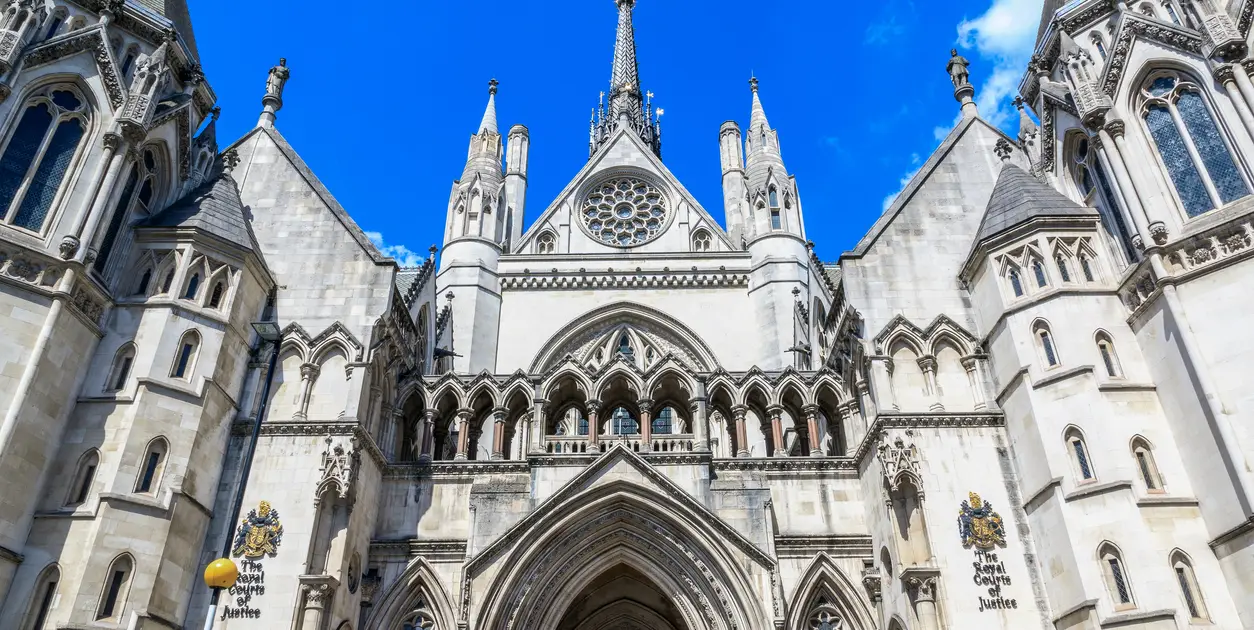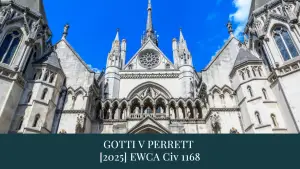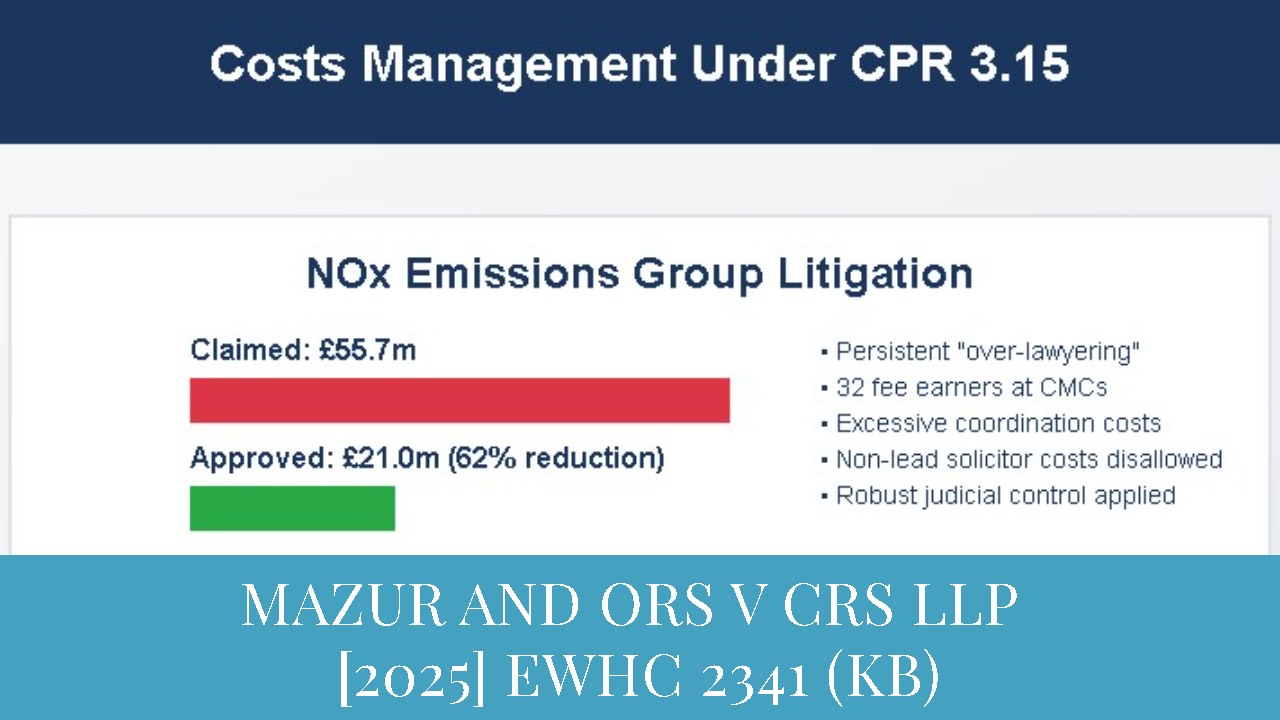The Court of Appeal’s decision in Gotti v Perrett [2025] EWCA Civ 1168 establishes that all pre-action applications constitute “proceedings” for costs purposes, closing a potential loophole across civil litigation.
Background
The dispute originated from an application for an interim injunction made by the Appellant, Christian Gotti, against the Respondent, Karen Perrett, under the Protection from Harassment Act 1997. The application was issued at Worcester County Court on 4 July 2023 using Form N16A, the general application form for an injunction under CPR Part 23. The application was listed for a contested hearing on 3 August 2023, where the Appellant was represented by counsel and the Respondent appeared in person. Following the hearing, an interim injunction was granted.
The injunction order contained significant procedural defects. No undertaking was given by the Appellant to issue a claim form, as required by the then-in-force CPR PD25A, paragraph 4.4(1). The court also failed to give directions for the issue of a claim form. Furthermore, no cross-undertaking in damages was offered by the Appellant or recorded in the order, despite the Respondent’s evidence that she would suffer financial loss. A penal notice was included on the face of the order. No claim form was ever issued by the Appellant.
The application was later acknowledged by the Appellant himself to be “deeply misconceived” [§20, §26] for multiple reasons: the county court lacked jurisdiction for defamation claims; interim injunctions are unavailable in defamation where the defendant seeks to defend; the PfHA 1997 lacked jurisdiction as the Appellant lived in Scotland; and Article 10 ECHR issues were not addressed.
On 27 February 2024, the Respondent issued an application to discharge the injunction and for damages and costs. Upon receipt of this application, the Appellant performed what the Court described as a “spectacular volte face” [§25], conceded that his application for the injunction was “deeply misconceived” and accepted that the order should never have been granted. He consented to its immediate discharge. However, he argued that as no Part 7 or Part 8 claim form had ever been issued, there were no valid “proceedings” before the court. Consequently, he contended that the court had no jurisdiction to make orders for costs or damages in favour of the Respondent.
Costs Issues Before the Court
The central costs issue was whether the court possessed the jurisdiction to make ancillary orders for costs and damages upon the discharge of an injunction where: (i) no undertaking to issue a claim form was given or recorded; (ii) no cross-undertaking in damages was offered or recorded; and (iii) no claim form was ever subsequently issued. The Appellant’s position was that the absence of a substantive claim form meant the injunction application was a “nullity” and that no “proceedings” existed in which the court could exercise its powers.
A secondary issue was whether, if the court found there were no valid proceedings, it could invoke CPR rule 3.10 to remedy the procedural error of using Form N16A instead of the required Part 8 Claim Form (N208) for a claim under the Protection from Harassment Act 1997.
The Parties’ Positions
The Appellant’s Position: The Appellant argued that the court had no jurisdiction. He submitted that “proceedings” are started only when the court issues a claim form at the request of a claimant, pursuant to CPR rule 7.2(1). As no Part 7 or Part 8 claim form was ever issued, there were no proceedings. He contended that the use of Form N16A did not constitute a prescribed originating process for this type of claim and that the entire process was therefore a nullity. He relied on authorities such as Citation plc v Ellis and Peterson v Howard de Walden Estates Ltd to support the proposition that costs cannot be awarded without a claim form. He further argued that CPR rule 3.10 could not be used to correct a procedural error that occurred before the commencement of any proceedings.
The Respondent’s Position: The Respondent argued that the court did have jurisdiction. She contended that the application for an interim injunction, properly issued under CPR Parts 23 and 25, constituted “proceedings” to which the Civil Procedure Rules applied. She relied on the equitable jurisdiction of the court to grant injunctions, as confirmed in Fourie v Le Roux, and the wide interpretation of “proceedings” in section 147 of the County Courts Act 1984, which “includes both actions and matters.” She also pointed to the court’s costs jurisdiction under section 51 of the Senior Courts Act 1981, which applies to “costs of and incidental to all proceedings.” In the alternative, she argued that the error in using the wrong form could and should be remedied under CPR rule 3.10, citing authorities such as Hannigan v Hannigan and Reddy v General Medical Council.
The Court’s Decision
The Court of Appeal dismissed the appeal, upholding the decisions of the courts below. Both Lewison LJ (in granting permission) and HHJ Salmon described the Appellant’s argument as “an affront to common sense” [§5-6]. Lord Justice Cobb, giving the lead judgment, held that the application for an interim injunction constituted “proceedings” within the meaning of the relevant statutes and rules. The court’s reasoning was based on several key points.
-
- First, the court was exercising a statutory and equitable jurisdiction under section 38 of the County Courts Act 1984 when it granted the injunction. This power exists in “any proceedings,” a term which is not restricted to post-claim-form activity. The court endorsed the view that “proceedings” include any application with which the court is seised and in respect of which it is asked to make orders. The fact that the application was procedurally flawed and “deeply misconceived” did not mean it was a nullity; it simply meant the proceedings were brought in an inappropriate form.
- Second, the court’s costs jurisdiction under section 51 of the Senior Courts Act 1981 applies to “all proceedings,” which must be given the same wide interpretation. Civil courts routinely make costs orders on pre-action interim injunction applications.
- Third, disapplying the CPR and the overriding objective to a pre-action injunction application would be absurd, as such applications can have draconian consequences for respondents and must be dealt with justly. The Appellant’s concession that the court had jurisdiction to make and subsequently discharge the injunction was found to be inconsistent with his argument that the process was a nullity.
The court relied heavily on Lord Scott’s judgment in Fourie v Le Roux [2007] UKHL 1, which established that pre-action freezing orders are “not a nullity” and have “immediate effect” even without substantive proceedings [§58].
On the secondary issue, the court held that, if necessary, CPR rule 3.10 could be invoked to remedy the error of using Form N16A instead of Form N208. The error was one of procedure after proceedings had commenced, and it could be corrected to prevent the Appellant from benefiting from his own failure and to further the overriding objective. The case of Peterson was distinguished, as it concerned an error occurring before any proceedings were commenced.
In conclusion, the court found that the judges below were correct. The court had jurisdiction to make orders ancillary to the discharge of the injunction, including orders for costs and damages. The appeal was dismissed.
Wider implications beyond injunctions for costs jurisdiction in civil litigation
1. Pre-action applications generally The principle that “proceedings” under s.51 SCA 1981 encompasses any application where the court is asked to exercise jurisdiction extends to all pre-action remedies, not just injunctions. This would cover:
-
- Pre-action disclosure applications (CPR r.31.16)
- Norwich Pharmacal orders
- Pre-action inspection orders
- Any application under CPR Part 23 before a claim form
2. Procedurally defective proceedings The ruling that procedural errors don’t negate costs jurisdiction applies broadly. If parties commence any type of application using the wrong form or procedure, they cannot later rely on their own error to escape costs consequences. This prevents tactical exploitation of procedural mistakes across all litigation contexts.
3. Defining “proceedings” for costs purposes The Court’s expansive interpretation of “proceedings” – as any matter where the court is “seised” and asked to make orders [§69] – affects costs jurisdiction throughout the CPR. This could impact:
-
- Costs in struck-out claims
- Discontinued proceedings
- Applications dismissed for procedural non-compliance
- Stand-alone applications without underlying claims
4. CPR r.3.10 application The liberal approach to remedying procedural errors under CPR r.3.10 has implications for all litigation where the wrong form or process is used, confirming courts will prevent parties benefiting from their own procedural failures.
5. Section 51 jurisdiction The confirmation that s.51 SCA 1981 costs jurisdiction applies to “all proceedings” reinforces the court’s broad discretion over costs in any matter before it, strengthening the principle that costs follow the event regardless of procedural irregularities.
This decision essentially closes a potential loophole across civil litigation where parties might attempt to avoid costs liability through procedural technicalities.

CPR 38.6: Discontinuance And Costs – The Legal Principles
Discusses costs jurisdiction where proceedings are discontinued without substantive claims
Who Should Pay The Costs Of A Withdrawn And Undetermined Application?
Court of Appeal case examining costs jurisdiction for withdrawn applications and the court’s discretion under CPR 44.2
Recoverability Of Inquest Costs In A Civil Claim
Addresses the principles of costs recovery in proceedings that precede formal claims
CPR 45.8 Fixed Costs Apply To Interim Applications From Date Of Provisional Track Allocation
High Court decision on costs jurisdiction for interim applications
Part 20 Defendant Ordered To Pay 1/3rd Of Defendant’s Costs Of Defending The Action
Examines the court’s discretion under Section 51 Senior Courts Act 1981 to award costs in complex procedural scenarios
Court of Appeal: Fixed Costs Do Not Apply To Appeals But QOCS Does
Discusses Section 51 SCA 1981 and the court’s general discretion over costs in different procedural contexts


![FERNANDEZ V FERNANDEZ [2025] EWHC 2373 (Ch)](https://tmclegal.co.uk/wp-content/uploads/2025/09/Willis-Title-copy-copy-copy-copy-6.jpg)


![STOCKLER AND ANOTHER V THE CORPORATION OF THE HALL OF ARTS AND SCIENCES [2025] EWHC 2262 (SCCO)](https://tmclegal.co.uk/wp-content/uploads/2025/09/YT-Thumb-300x169.webp)











